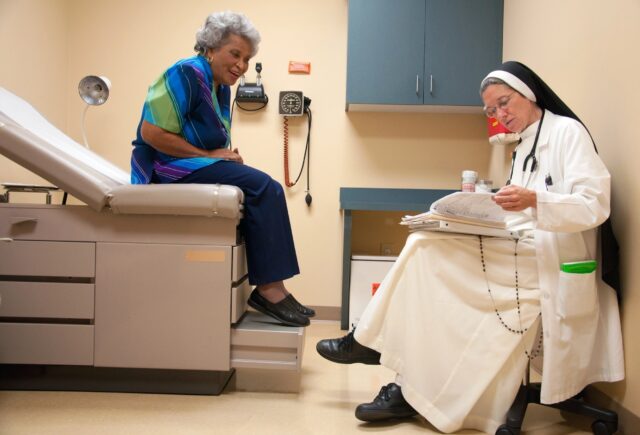
When it comes to end of life directives, Catholics would do well to read about the current protocols surrounding organ donation and the recent bioethics discussion surrounding brain death. Father Anthony Stoeppel, a diocesan priest of the Diocese of Tyler, Texas and professor of church management at the Catholic University of America’s Busch School of Business, spoke with OSV News’ Charles Camosy about what he’s learned about the ethics of organ donation from his dissertation on the topic.
Charles Camosy: Can you tell us a bit about your background and how it led you to write a dissertation exploring the moral issues surrounding organ donation?
Father Anthony Stoeppel: I’m a bi-ritual Latin-Byzantine diocesan priest teaching at Catholic University of America’s Busch School of Business Church Management Program. I’ve also served as a seminary professor, vicar general of my diocese, and pastor of two parishes.
Bishop Álvaro Corrada del Rio asked me to study bioethics with an eye toward assisting the Catholic hospitals in the diocese with medical moral questions that arose. The bioethics professor at the university where I studied suggested a few dissertation topics. I chose mutilation in the context of living-donor organ transplantation because it allowed me to study at a deeper level the moral object of a human act, which was of interest to me.
Camosy: I’ve had the privilege of skimming through that dissertation, and it is a real contribution to the debate. How would you characterize the “state of the question” when it comes to Catholic teaching for living donors?
Father Stoeppel: The first transplants at the beginning of the 20th century were things like blood and corneas, where the donors are still alive. Catholic theologians held mixed opinions about these living donor transplantations because they viewed the removal of something from our bodies as a mutilation. Some theologians thought the mutilation was justifiable, while others held that mutilation is always wrong.
Pope Pius XII in the mid-20th century tended to speak positively about transplantations so long as the principle of totality was upheld, meaning the removal didn’t cause irreparable damage to the integrity of the donor for the sake of the recipient or a social good. In Evangelium Vitae St. John Paul II called organ donation “praiseworthy,” but in Veritatis Splendor he labeled mutilation as an intrinsically evil act. I proposed a definition of mutilation that would differentiate mutilation from donation and thus justify transplantation from a living donor. I argue that the choice to mutilate and the choice to donate are two distinct human acts.
Camosy: It seems like the current debate is mostly related to questions about who is alive, who is dead, and how we can do and determine this in advance of organ donation. Does this sound right to you?
Father Stoeppel: Absolutely. In accordance with the Catechism, the prevailing opinion holds that the donation of a single vital organ, like a heart, can only occur morally after the patient has died. For most of human history we defined death as having occurred after the heart and lungs no longer function.
Because organs deteriorate quickly once the heart and lungs no longer pump oxygen-rich blood to them, transplantation of single vital organs would rarely take place because of the logistical challenges of having a recipient ready in the same hospital at the moment of the donor’s death.
Everything changed, though, in 1968 when Harvard University moved away from a cardiopulmonary definition of death where the heart and lungs no longer function to a neurological criteria known as “brain death.” If someone is “brain dead” we can declare the person “dead” while the rest of the body, with the assistance of machines, continues to function.
This change in the definition of death increased the possibilities of transplantation because it meant that a patient might be declared “brain dead,” but single vital organs could be preserved by machines for transplantation until the recipient arrives at the hospital. The number of transplantations, especially of single vital organs, grew rapidly.
In 2000, St. John Paul II said that declaring a patient dead when all brain activity ceases “does not seem to conflict” with Catholic teaching. Since then, cases where the patient continues to show signs of life even after being declared dead and concerns over emergency room protocols for declaring a potential donor dead have led some serious Catholic thinkers to question whether the neurological criteria for death still holds. Rightly or wrongly, the changing landscape regarding transplantation has led many in recent years to reconsider being an organ donor.
Camosy: Do you have advice for faithful Catholics who want to think carefully about this topic? Especially as they make their own decisions about organ donation?
Father Stoeppel: Donation of body parts from a living donor like kidneys, liver lobes and blood is meritorious and saves lives. The donation of any organs may take place after death. For Catholics, “brain death” is the “complete and irreversible cessation of all brain activity,” which would be all three parts of the brain.
Admittedly, over a quarter-century has passed since St. John Paul II rendered this opinion on brain death and much has happened. Exceptional cases in the news and significant strides in medical advances have raised questions among Catholics about the use of the neurological criteria to determine when death has occurred.
These currents have led to theoretical opinions about donating single vital organs. Therefore, I would not be surprised if magisterial moral guidance regarding organ transplantation and brain death gets updated.
In the meantime, the pronouncement given by St. John Paul II still holds as a morally licit option for Catholics to use for themselves and their loved ones. Given the importance of these decisions, Catholics do well to study what the church teaches, prepare end-of-life documents in accordance with Catholic morality, discuss their wishes with their medical power of attorney, and make updates as circumstances regarding their health change.
Charles Camosy teaches moral theology and bioethics at The Catholic University of America in Washington.











